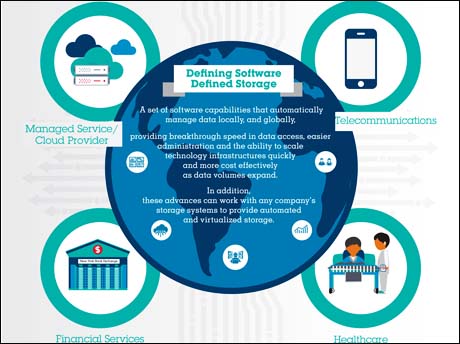
Bangalore, May 20, 2014 –Software defined Radio, Software defined networks... can Software defined Storage be far behind? IBM says no -- and this week, introduces a portfolio of software defined storage products that deliver improved economics at the same time they enable organizations to access and process any type of data, on any type of storage device, anywhere in the world.
One particular technology in the portfolio, codenamed “Elastic Storage,” offers infinite scale, and is capable of reducing storage costs up to 90 percent by automatically moving data onto the most economical storage device.
Created at IBM Research Labs, this new technology allows enterprises to exploit – not just manage – the exploding growth of data in a variety of forms generated by countless devices, sensors, business processes, and social networks. The new storage software is ideally suited for the most data-intensive applications, which require high-speed access to massive volumes of information – from seismic data processing, risk management and financial analysis, weather modeling, and scientific research, to determining the next best action in real-time retail situations.
Says Sandeep Dutta, Associate Director - IBM Storage Systems, India/South Asia: “Digital information is growing at such a rapid rate and in such dramatic volumes that traditional storage systems used to house and manage it will eventually run out of runway.”
Software-defined storage is a set of software capabilities that automatically manage data locally and globally, providing breakthrough speed in data access, easier administration and the ability to scale technology infrastructures quickly and more cost-effectively as data volumes expand. In addition, these advances can work with any company’s storage systems to provide automated and virtualized storage.
Man v. Machine
Elastic Storage was used for the Jeopardy! television match between IBM's Watson and two former Jeopardy! champions. For the show, IBM’s Watson had access to 200 million pages of structured and unstructured data, including the full text of Wikipedia. By using Elastic Storage, the five terabytes of Watson’s “knowledge” (or 200 million pages of data) were loaded in only minutes into the computer’s memory.A key reason the software was chosen for the Watson system that competed onJeopardy! was its scalability, the architectural limits for which stretch into the thousands of “yottabytes.” A yottabyte is one billion petabytes, or the equivalent of a data centre the size of one million city blocks.
More info: IBM Data and Analytics:
Free book: Software defined storage for dummies
Infographic